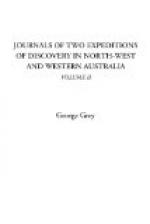The boyl-yas eat up a great many natives, they eat them up as fire would; you and I will be very ill directly. The boyl-yas have ears: by-and-by they will be greatly enraged. I’ll tell you no more.
The boyl-yas move stealthily, you sleep and they steal on you, very stealthily the boyl-yas move. These boyl-yas are dreadfully revengeful; by-and-by we shall be very ill. I’ll not talk about them.
They come moving along in the sky, cannot you let them alone. I’ve already a terrible headache, by-and-by you and I will be two dead men.
The natives cannot see them. The boyl-yas do not bite, they feed stealthily; they do not eat the bones, but consume the flesh. Just give me what you intend to give, and I’ll walk off.
The boyl-yas sit at the graves of natives in great numbers. If natives are ill, the boyl-yas charm, charm, charm, charm, and charm, and by and by the natives recover.
...
I could learn nothing further from him.
The Wau-gul is an imaginary aquatic monster, residing in fresh water and endowed with supernatural power which enables it to consume the natives, although it generally attacks females. The person it selects for its victim pines away almost imperceptibly and dies.
SUPERSTITION AND THEIR OPINION REGARDING THE NIGHTMARE.
The natives believe that the nightmare is caused by some evil spirit. The way in which they get rid of this evil being is by jumping up, seizing a lighted brand from the fire, twirling it round the head, and muttering a variety of imprecations; they then throw the stick away in the direction they conceive the spirit to be in. Some of them have explained this custom to me by stating that this evil spirit wants a light, and that when he gets it he will go away. They however also take the precaution of moving their position and getting as far as they can into the group of natives who are sleeping round the fire.
If they are obliged to move away from the fire after dark, either to get water or for any other purpose, they carry a light with them and set fire to dry bushes as they go along.
VENERATION FOR CRYSTAL STONES.
The natives of South-western Australia likewise pay a respect, almost amounting to veneration, to shining stones or pieces of crystal, which they call Teyl. None but their sorcerers or priests are allowed to touch these, and no bribe can induce an unqualified native to lay his hand on them.
The accordance of this word in sound and signification with the Baetyli mentioned in the following extract from Burder’s Oriental Customs (volume 1 page 16) is remarkable:
And Jacob rose up early in the morning, and took the stone that he had put for his pillow, and set it up for a pillar, and poured oil upon the top of it, and he called the name of that place Bethel. Genesis 28:18.
From this conduct of Jacob and this Hebrew appellation, the learned Bochart, with great ingenuity and reason, insists that the name and veneration of the sacred stones called Baetyli, so celebrated in all Pagan antiquity, were derived.




